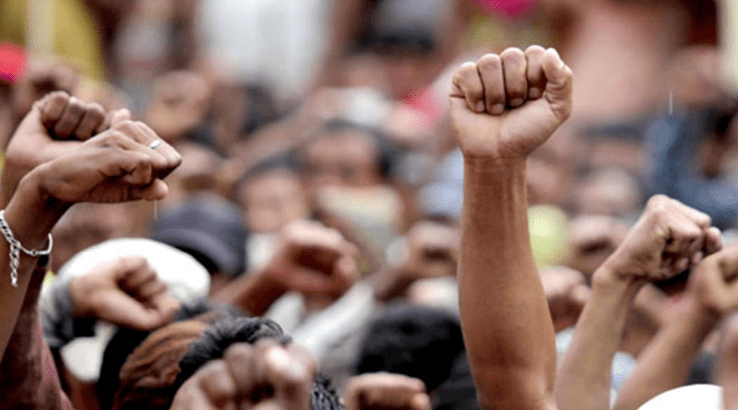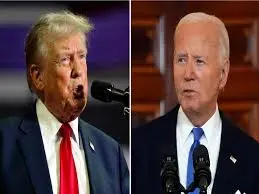In a recent statement that has stirred intense reactions, President Joe Biden allegedly warned of a potential “bloodbath” if former President Donald Trump were to lose in the upcoming 2024 election. As political tensions continue to deepen across the country, this statement, whether viewed as a genuine concern or a political move, raises some hard questions. Why would the result of an election lead to violence? And what does this reveal about the current state of American democracy?
Let’s dive into what this warning means, why it has so many people talking, and what it could mean for both the election and the nation as a whole.
Rising Tensions in U.S. Politics

U.S. politics has always been contentious, but recent years have taken divisiveness to unprecedented levels. The highly polarized environment, amplified by social media and a 24-hour news cycle, has created a battleground of ideas and loyalties that often boils over into violence. From the Capitol riot on January 6, 2021, to ongoing political standoffs in local and state governments, political violence feels less like a distant threat and more like a present risk.
So, when Biden warns of potential violence or a “bloodbath” if Trump loses the 2024 election, it reflects not just a personal opinion but also a growing public anxiety about the impact of the country’s political polarization. For Biden, a Trump loss could be a triggering event for a segment of Trump’s most ardent supporters. The implication is clear: if certain factions feel the election outcome is illegitimate or unfair, it could lead to civil unrest.
Why This Election Could Be Different
Trump and Biden’s rivalry is more than just a clash of policies—it’s become a cultural conflict, one that goes beyond political ideologies. Trump has fostered a passionate following that sees him as a crusader against what they believe to be a corrupt “deep state” and elite establishment. On the other hand, Biden’s administration emphasizes a more traditional approach to governance and seeks to address the needs of those who feel left behind by Trump’s populism.
If Trump loses, especially by a narrow margin, it’s possible that claims of a “stolen election” or allegations of voter fraud could resurface, stirring distrust in the electoral process. When people believe that their voices are not heard, anger can grow quickly. While Biden’s warning may sound drastic, the fear is based on real historical and social dynamics. The United States has seen unrest at various points in its history, and the stakes of this election feel especially high to both parties.
The Role of Media and Social Networks in Fueling Division

Media coverage plays a substantial role in shaping public opinion and influencing voter sentiment. In the era of social media, information—and misinformation—spreads quickly, sometimes without accountability. Narratives of fraud or injustice could potentially go viral, feeding into existing resentments and giving people a “reason” to engage in civil disobedience or worse. From viral videos to instant news alerts, people’s fears and frustrations can be validated and amplified in ways we haven’t seen before.
Add to this the challenge of echo chambers, where individuals are exposed primarily to viewpoints that align with their own beliefs, and the result is a populace increasingly resistant to compromise or differing perspectives. Biden’s comment could be seen as a warning against this environment, urging Americans to critically engage with news sources and think about the broader consequences of political extremism.
How Can We Prevent Violence Post-Election?
What can the government, media, and American citizens do to prevent such violence or unrest?
- Promote Election Integrity: Transparency in the election process is crucial. Whether it’s ensuring fair access to voting, countering misinformation, or investigating claims of fraud, government officials need to make every effort to promote trust in the system.
- Encourage Civil Discourse: Political leaders on both sides must encourage calm and emphasize peaceful participation. Whether voters support Biden, Trump, or a third candidate, they should be encouraged to channel their voices through lawful, democratic means.
- Support Local and National Dialogues: By investing in programs that foster conversations across party lines, Americans may find that they share more in common than they think. When people communicate and seek to understand opposing views, it reduces the fear and hostility that often lead to violence.
- Engage in Media Literacy: Social media and news outlets are central to the spread of both factual information and misinformation. By encouraging people to verify information, consider the source, and avoid spreading unverified claims, communities can guard against unnecessary panic or distrust.
Final Thoughts: The Stakes Are High, But Unity Is Possible
As we head into the 2024 election, the United States finds itself at a political crossroads. Biden’s warning of a “bloodbath” reflects a real concern that the democracy Americans cherish may come under strain as emotions run high. But we don’t have to succumb to division. With strong, fair policies and a commitment to respecting the election results—no matter the outcome—Americans have the power to maintain peace and ensure the strength of their democracy.
The next few months will be challenging, but they also offer a unique opportunity. Americans have the chance to show the world that democracy, even when tested, can be resilient and reflective of the people’s will. And no matter the outcome, the hope is that voters, politicians, and communities will prioritize peace and unity over division.

